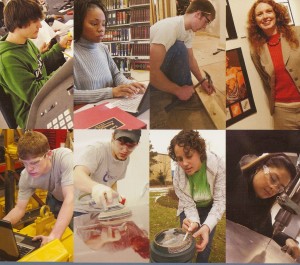 Wouldn’t it be great to graduate from college with a career and not just a job? Students all over the country dream of graduating from college with a job. Penn College students graduate with a career.
Wouldn’t it be great to graduate from college with a career and not just a job? Students all over the country dream of graduating from college with a job. Penn College students graduate with a career.
During my time on campus I spoke with students from all career concentrations and the overwhelming response was, “This education is preparing me for a career, and for a career that I love.” That’s the key—students at Penn College don’t just earn a degree; they discover their true passion and learn the skills to pursue it.
There’s no better way to see the impact of this college than through the words of its students and the companies who employ them.
94% of graduates responding to a survey were employed, continuing their education, or serving in the military within one year of graduation.
“I will … not be left with what so many college graduates are left with … uncertainty about the future. All the degree programs at Penn College prepare students for having a job and take away the uncertainty.” — Matthew Stoltz, Physician Assistant
“My major was a mix of theory and lab … that’s why I came here (Penn College). The reward for completing this major is job security.” —Jorgette Grosso, Systems Application Engineer, Schneider Electric Co.
“In this field (Building Automation Technology), you can write your ticket before graduating … I couldn’t have picked a better place to go.” — Adam Yoder, Service Energy Analyst, Honeywell International
“Throughout each day I am faced with a very wide variety of troubleshooting issues. From networking and communication, to PLC programming, to component and other circuit issues, Penn College has prepared me for it all. I would not be as successful as I am today if I hadn’t made the decision to get my degree from Pennsylvania College of Technology.” –Francis “Dave” Nevill, Controls Engineer, First Quality Enterprises, Inc.
“The hands-on education from Penn College allowed me to hit the ground running from day one on the job. I was able to contribute to my company with the technical skills I’ve learned from college.”—Zachary Brook, Pennsy Corporation
“I attribute the hands-on, strong, and practical work ethic I received from Penn College as the building block to my accelerated career path.”—Sean Stabler, Business Development Engineer, Arkema, Inc.
“Industrial and technological change is inevitable and these changes require a deeper understanding of asset procurement, integration, and organizational-change management … take advantage of the diverse curriculum and extracurricular activities at Penn College to advance in industry, as well as in life.”—Robert Blauser, Manufacturing engineer leader, Harley-Davidson Motor Company
In 2013-14, more than 75 employers participated in on-campus recruiting information and interview sessions, 34 Fortune 500 companies recruited Penn College students and alumni, and 367 employers offering more than 5,200 jobs attended the Penn College Career Fairs.
“We are proud that we have added another Penn College graduate to our team.” — Roger Kipp, Vice President-Engineering, McClarin Plastics, Inc.
“Pennsylvania College of Technology has provided Synthes, USA with a valuable talent pool of manufacturing engineers, engineering technicians, and CNC machinists over the past eight years … In fact, our #1 source for manufacturing engineers over the past several years has been Penn College alumni.”—Mike Sticklin, SPHR, Human Resources Manager, Synths USA Brandywine Plant
Penn College is providing its students with more than a college education. It is preparing them for a career coupled with a unique college experience, a college with all the offerings of any four year university, and a faculty committed to giving their students a hands-on education.
Check out the other articles in the Degrees That Work series: Degrees That Work: One College’s Best Kept Secret; Degrees That Work: A Working World Within a College



 When choosing a
When choosing a 



![USU - Heather Jensen[5]](http://www.parentingforcollege.com/wp-content/uploads/2015/07/USU-Heather-Jensen5-150x150.jpg)


